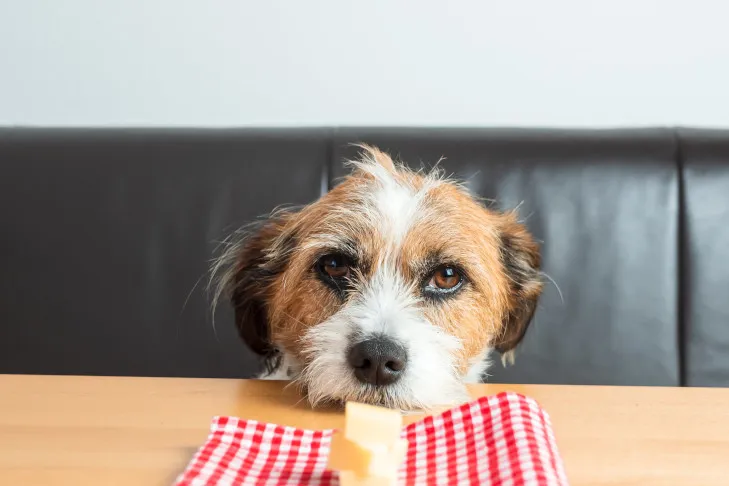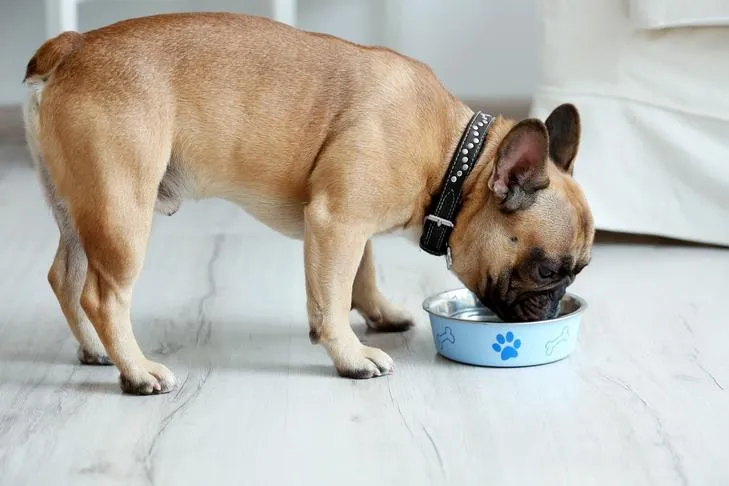The sight of your beloved canine companion gazing up at you with soulful eyes as you enjoy a meal is a common experience for many pet owners. It’s tempting to share a bite of your food, to include them in the family feast. However, what’s perfectly safe and delicious for humans can be toxic, or even deadly, for dogs. Their digestive systems and metabolisms are vastly different from ours, making many common table foods dangerous. Understanding What Table Food Should Dogs Not Eat is crucial for ensuring their long-term health and safety.
While your dog might seem to enjoy a stolen morsel, even a small amount of certain human foods can lead to serious health issues, ranging from upset stomachs and allergic reactions to organ failure and death. Being vigilant about what your dog consumes, whether directly from your plate or found on the floor, is an essential part of responsible pet ownership. To provide the best care for your furry friend, it’s vital to recognize the foods that pose a threat and keep them well out of reach. For a broader understanding of safe and unsafe foods, explore what foods can dogs eat and cannot eat.
The Obvious Culprits: Chocolate, Caffeine, and Alcohol
Some of the most well-known dangers lurk in common household items that many people enjoy daily. These items contain compounds that dogs cannot metabolize efficiently, leading to toxic build-ups in their systems.
Chocolate
Chocolate is perhaps the most famous toxic food for dogs, and for good reason. It contains theobromine, a stimulant similar to caffeine, which dogs process much more slowly than humans. This slow metabolism allows theobromine to accumulate to toxic levels. The darker the chocolate (baking chocolate, dark chocolate, cocoa powder), the higher the concentration of theobromine, and thus the more dangerous it is. Even white chocolate, despite its low cocoa content, can be harmful due to its fat and sugar. Symptoms of chocolate poisoning can appear within hours and include vomiting, diarrhea, increased thirst, restlessness, hyperactivity, tremors, seizures, and in severe cases, heart problems and death.
Caffeine
Similar to chocolate, caffeine is a methylxanthine that can be highly toxic to dogs. Found in coffee, tea, energy drinks, and some medications, caffeine can cause symptoms such as hyperactivity, restlessness, elevated heart rate, tremors, seizures, and even collapse. Even small amounts can have a significant impact, especially on smaller dogs. It’s vital to keep all caffeinated products out of your dog’s reach.
Alcohol
Alcoholic beverages and food products containing alcohol, such as raw bread dough, are extremely dangerous for dogs. Ethanol, the intoxicating agent in alcohol, affects a dog’s liver and brain in the same way it affects humans, but much more quickly and severely. Even a small amount can lead to vomiting, diarrhea, disorientation, coordination problems, difficulty breathing, tremors, coma, and can be fatal. Raw bread dough is also problematic because the yeast produces ethanol during fermentation, leading to alcohol poisoning and potentially stomach bloat, which is a life-threatening condition.
Hidden Dangers in Fruits and Vegetables
While many fruits and vegetables are healthy for humans, some can be highly toxic to dogs due to specific compounds they contain.
Grapes and Raisins
Grapes and raisins are notoriously toxic to dogs, capable of causing acute kidney failure. The exact toxic substance is unknown, but even small quantities can be lethal. Symptoms typically appear within 6-12 hours of ingestion and include vomiting, lethargy, diarrhea, and decreased appetite. If left untreated, these can progress to severe dehydration, increased urination followed by decreased urination, and ultimately kidney failure, which can be fatal within days.
Onions, Garlic, and Other Allium Plants
All members of the Allium family, including onions, garlic, leeks, chives, and shallots, are highly toxic to dogs. They contain compounds called thiosulphates, which damage a dog’s red blood cells, leading to a condition called hemolytic anemia. Garlic is considered five times more potent than onions. Symptoms, which can be delayed for several days, include lethargy, weakness, pale gums, elevated heart rate, and orange- to dark-red tinged urine. Certain Japanese breeds like Akitas and Shiba Inus are particularly sensitive. It’s important to remember that these are dangerous in all forms: raw, cooked, powdered, or dehydrated. For specific information about the dangers of onions, refer to what in onions is bad for dogs.
Avocado
Avocados contain a fungicidal toxin called persin, which is generally safe for humans but can be harmful to dogs. Persin is found in the fruit, pit, leaves, and bark of the avocado plant. In dogs, ingesting too much persin can lead to vomiting and diarrhea. More severely, it can cause fluid accumulation in the lungs and chest, leading to breathing difficulties, or in the heart, pancreas, and abdomen, potentially resulting in fatal complications. Beyond the chemical toxicity, the large pit of an avocado also poses a significant choking hazard or can cause a blockage in the digestive tract.
Pits and Seeds of Fruits
While the flesh of some fruits like apples (without seeds) or bananas can be safe in moderation, many fruit pits and seeds contain cyanide, which is toxic. Apple seeds, cherry pits, peach pits, and apricot pits all contain cyanide and should be kept away from dogs. Furthermore, the hard pits themselves can cause choking or intestinal obstructions, which require immediate veterinary intervention. For more details on fruits to avoid, consult what fruits are dogs not supposed to eat.
 A curious dog with soft fur looking intently at a kitchen counter.
A curious dog with soft fur looking intently at a kitchen counter.
Sweeteners, Spices, and Dairy: More Than Just an Upset Stomach
Beyond the obvious, seemingly innocuous ingredients can hide severe dangers for your pet.
Xylitol
Xylitol is a sugar alcohol commonly used as a sweetener in many sugar-free products, including chewing gum, candy, toothpaste, peanut butter, and baked goods. While safe for humans, it is extremely toxic to dogs. Even a small amount can cause a rapid and significant drop in blood sugar (hypoglycemia), leading to symptoms like vomiting, lethargy, loss of coordination, and seizures. If left untreated, xylitol poisoning can quickly progress to liver failure and be fatal. Always check ingredient labels on human foods before sharing them, especially peanut butter.
Salt and Salty Foods
Too much salt can lead to sodium ion poisoning in dogs. While dogs need some salt, excessive intake from foods like chips, pretzels, salted nuts, or even homemade meals with too much seasoning can be dangerous. Symptoms of salt toxicity include excessive thirst and urination, vomiting, diarrhea, depression, tremors, elevated body temperature, and seizures. In severe cases, it can lead to kidney damage, neurological disorders, cerebral edema, and even death. It’s crucial to ensure your dog always has access to fresh water, especially if they’ve consumed anything salty.
Excessive Fats and Fried Foods
Foods high in fat, whether from fried foods, fatty cuts of meat, or rich sauces, can be detrimental to a dog’s health. While not immediately toxic in the same way as chocolate or xylitol, these foods can cause severe gastrointestinal upset, including vomiting and diarrhea. More concerning, they can trigger pancreatitis, an inflammation of the pancreas that can be extremely painful and life-threatening. Pancreatitis often requires hospitalization and can lead to chronic health problems.
Dairy Products (in excess)
Many dogs are lactose intolerant, meaning they lack the enzyme lactase needed to digest the lactose in dairy products. While a small amount of plain yogurt or cheese might be tolerated by some, larger quantities or regular consumption can lead to digestive upset, including gas, bloating, diarrhea, and vomiting. While not typically life-threatening, it can be very uncomfortable for your dog.
 A small dog with alert ears sitting attentively, possibly waiting for a treat.
A small dog with alert ears sitting attentively, possibly waiting for a treat.
Nuts and Other Miscellaneous Hazards
Some less obvious items found in our kitchens or pantries can also pose serious risks.
Macadamia Nuts
Macadamia nuts are highly toxic to dogs, though the exact mechanism of toxicity is still unknown. Ingestion can lead to symptoms such as weakness, depression, vomiting, tremors, and hyperthermia (elevated body temperature). These symptoms usually appear within 12 hours and typically resolve within 24-48 hours, but veterinary attention is often needed. Due to their high fat content, macadamia nuts can also contribute to pancreatitis.
Almonds, Pecans, Walnuts
While not as acutely toxic as macadamia nuts, other nuts like almonds, pecans, and walnuts contain high amounts of oils and fats. These fats can cause gastrointestinal upset, vomiting, and diarrhea, and increase the risk of pancreatitis, similar to excessively fatty foods. Walnuts, especially black walnuts, can also develop molds that are toxic to dogs. Additionally, the size and hardness of these nuts can present a choking hazard or lead to intestinal blockages.
Raw Yeast Dough
As mentioned under alcohol, raw yeast dough is a double threat. The active yeast can ferment in the dog’s warm stomach, producing alcohol (ethanol) and leading to alcohol poisoning. Additionally, the dough can rise and expand significantly in the stomach, causing extreme bloating (gastric dilatation), which can be incredibly painful, lead to tissue damage, difficulty breathing, and potentially bloat-volvulus (GDV), a life-threatening condition requiring emergency surgery.
 A cute puppy lying comfortably on a grassy area outdoors.
A cute puppy lying comfortably on a grassy area outdoors.
Preventing Accidental Poisoning
Preventing your dog from eating harmful table foods requires constant vigilance and proactive measures. Here are some essential tips:
- Educate All Household Members: Ensure everyone in your home, including children and guests, understands which foods are off-limits for your dog.
- Secure Food Storage: Keep toxic foods in sealed containers, high shelves, or locked cabinets where curious paws and noses cannot reach them.
- Supervise Meal Times: Avoid leaving food unattended on counters or tables. If you can’t supervise, confine your dog to another room during meals or when preparing food.
- Discard Scraps Carefully: Dispose of all food scraps, especially those containing toxic ingredients, in secure bins that your dog cannot access.
- Use Dog-Specific Treats: Offer your dog treats specifically formulated for canines, rather than human foods, to reward good behavior.
- Be Mindful of Hidden Ingredients: Many processed human foods contain hidden ingredients like onion powder, garlic powder, or xylitol. Always read labels.
- Know Your Emergency Contacts: Have your veterinarian’s number and the nearest emergency veterinary clinic’s number readily available.
Understanding these dangers is paramount. If your dog accidentally ingests a potentially toxic food, contact your veterinarian immediately. Early intervention can make a significant difference in the outcome. Should your dog become ill, knowing when dogs are sick what can they eat becomes crucial for their recovery.
Conclusion
The bond we share with our dogs is built on love, trust, and care. Part of that care involves protecting them from harm, especially from the seemingly innocent foods we enjoy every day. Knowing what table food should dogs not eat is not just a recommendation; it’s a vital aspect of responsible pet ownership that can prevent serious illness and even save your dog’s life.
By keeping your dog on a diet specifically designed for their nutritional needs and being acutely aware of the dangers that human foods pose, you contribute significantly to their health and happiness. Always err on the side of caution. When in doubt about whether a food is safe, it’s best to refrain from sharing it. Consult your veterinarian for any dietary concerns or if you suspect your dog has eaten something harmful. Stay informed, stay vigilant, and help your furry friend live a long, healthy life by your side.
